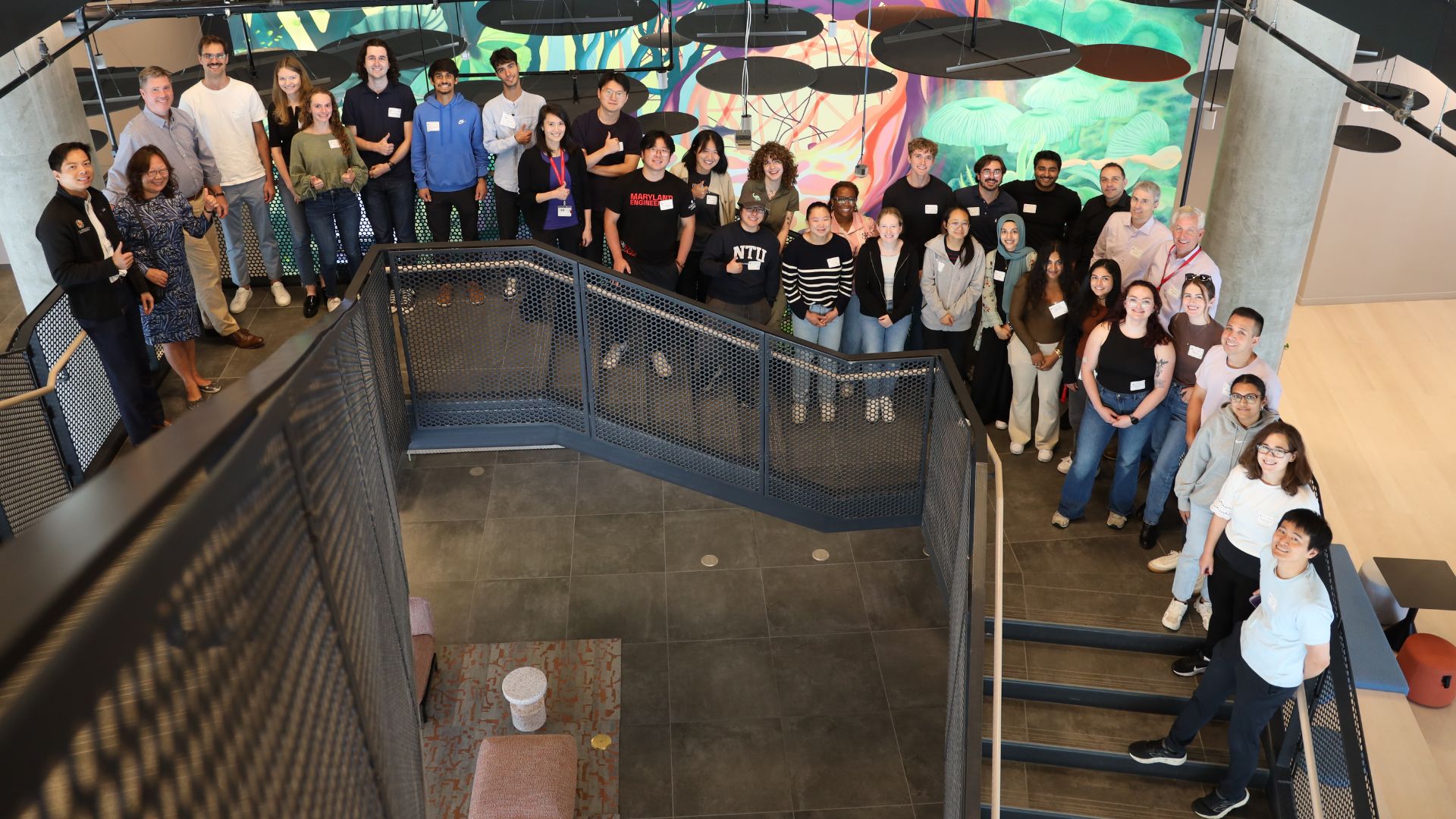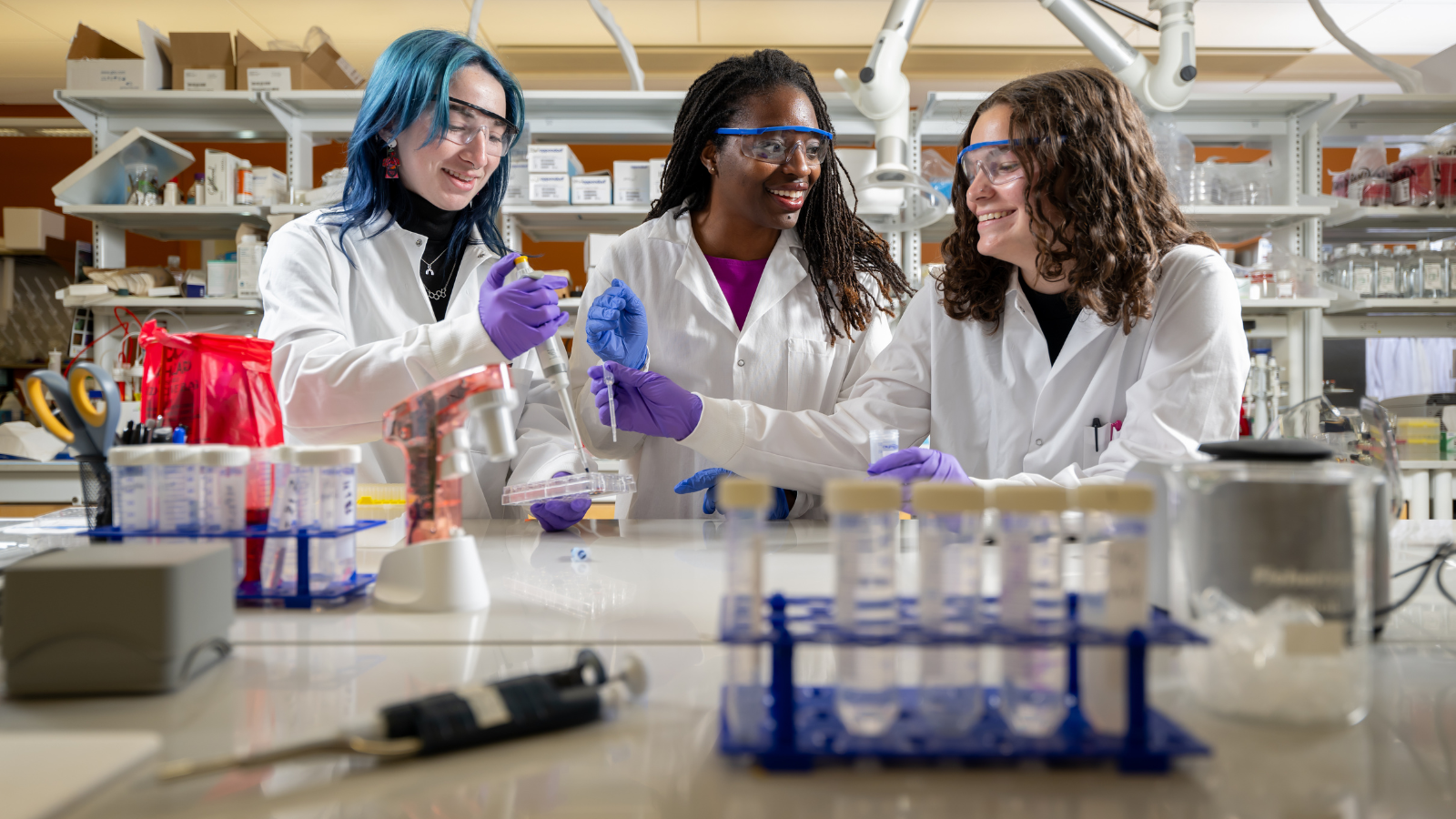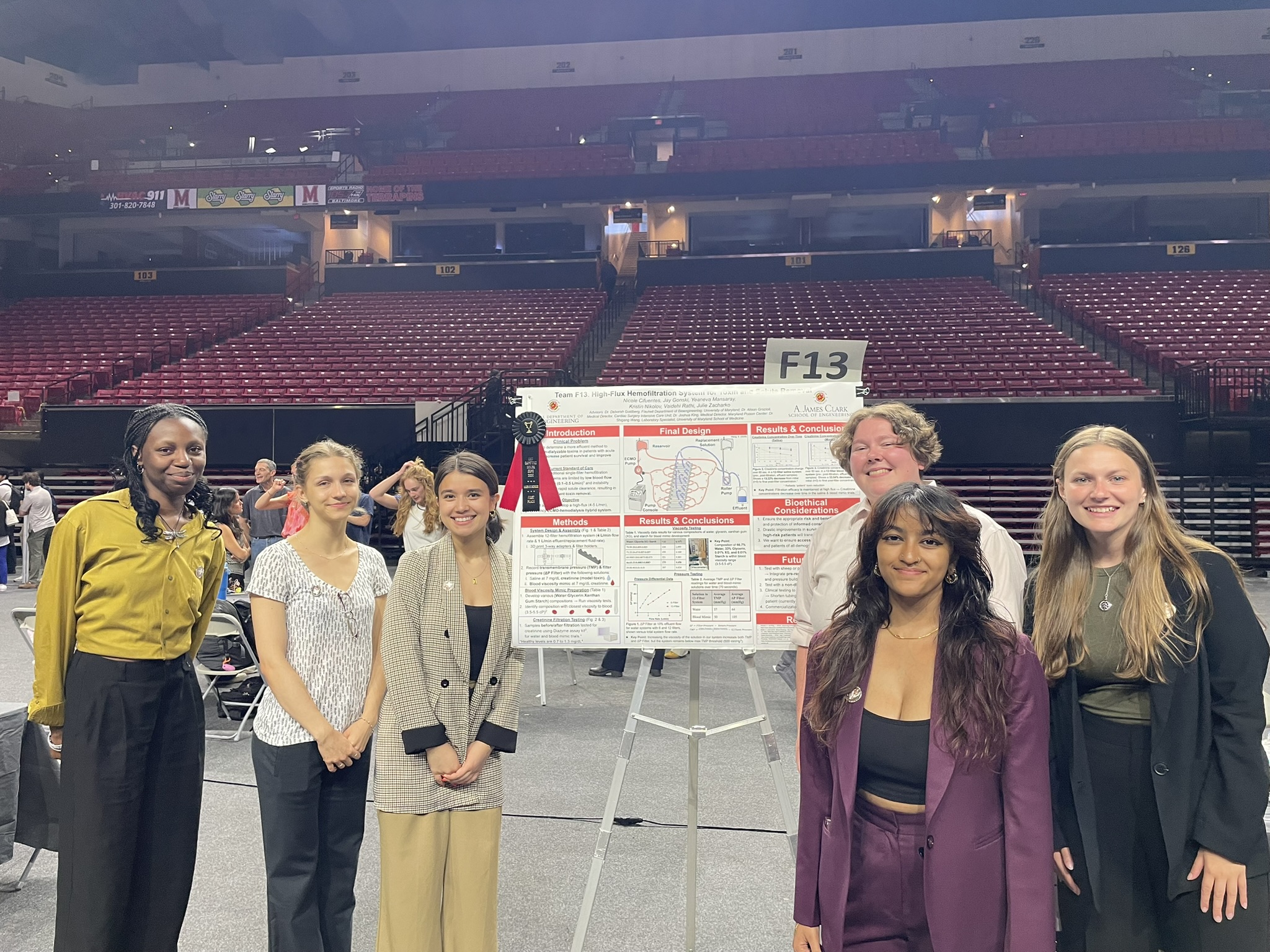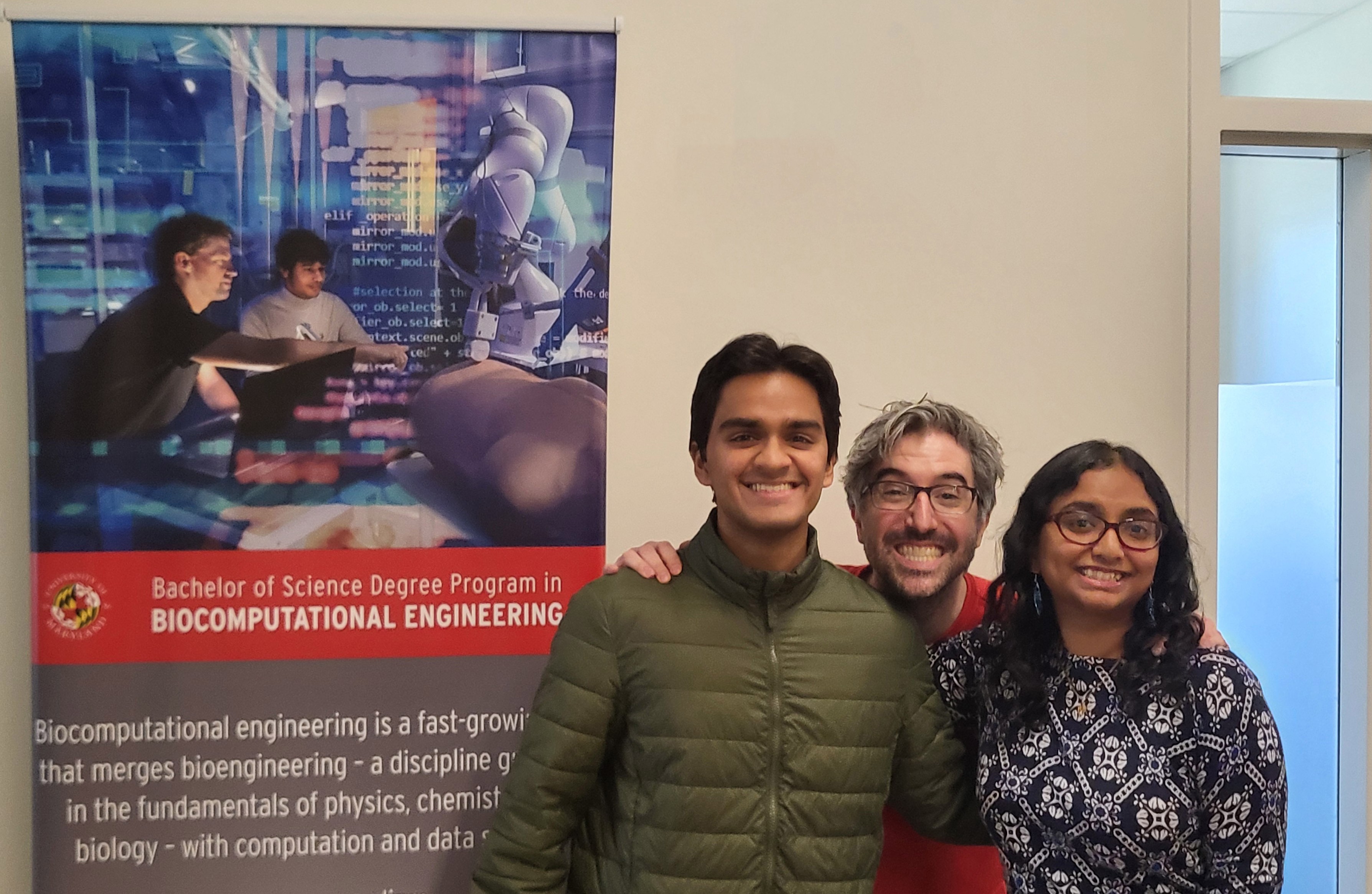News Story
Three BIOE Students Receive 2024-2025 MPower Graduate Fellowships
The University of Maryland’s (UMD) Fischell Department of Bioengineering (BIOE) and the Schools of Dentistry, Medicine, and Pharmacy (UMB) awarded the 2024-2025 MPower Graduate Fellowship to three BIOE Ph.D. students: Kathleen Trang, Rohey Colley, and Tianfeng Miao. Through this fellowship, the recipients will engage in joint research projects as part of a collaborative Ph.D. program with both universities, offering an opportunity to develop and provide technical solutions for pressing clinical challenges in medicine, pharmacy, or dentistry.

Kathleen Trang is a first-year Ph.D. student in Assistant Professor Alex Xu’s Spatial Biology Lab, where she studies the spatial relationships between cells and extracellular components to better understand disease mechanisms. Using tissue microarrays, her team applies fluorescent staining to visualize up to 40 different proteins simultaneously, generating large-scale, information-rich images. These images inform a machine learning algorithm to identify potential therapeutic targets.
Trang was drawn to UMD for its strong ties to government research institutions and its highly collaborative environment. As a computational bioengineer, she values the ability to bridge the gap between data-driven research and clinical applications.
One of her most significant research accomplishments came during her time at the University of Florida, where she published a method to improve accessibility in single-cell migration assay analysis. This milestone reinforced her interest in computational image processing and machine learning’s role in advancing bioengineering research.
As an MPower Fellow, Trang is excited to apply her computational expertise in a clinical setting for the first time. Working alongside Associate Professor of Obstetrics, Gynecology, and Reproductive Sciences at UMB, Dr. Dana Roque, she aims to expand her team’s analysis methods beyond cellular structures to include extracellular components, furthering the understanding of the ovarian cancer tumor microenvironment. Her research will also employ machine learning to explore how different protein expression levels influence immune infiltration, potentially leading to new therapeutic approaches.
“I’m incredibly grateful to have been awarded the MPower Fellowship,” Trang says. “This opportunity allows me to translate computational methods into tangible clinical insights. In the future I hope that my research can be applied to a broad range of diseases beyond ovarian cancer.”

Rohey Colley is a first-year Ph.D. student in Assistant Professor Erika Moore’s Lab. Colley's research focuses on immune engineering, particularly the role of macrophages in tissue repair, regeneration, and disease progression. She investigates how macrophages respond to mechanical and biochemical cues within 3D biomaterial environments, which has significant implications for understanding inflammatory diseases and fibrosis.
"The department’s layout fosters interdisciplinary interaction, eliminating barriers to communication and making it easy to engage with researchers across different specialties."
-Rohey Colley
One of the most significant moments in Colley’s research career was conducting her capstone project on pulmonary embolism, a condition that nearly took her mother’s life after her younger brother’s birth. This personal connection reinforced her passion for improving medical outcomes. Her project focused on developing an AI-driven method for volumetric assessment of pulmonary artery thrombus burden, addressing a major public health concern.
Colley was drawn to UMD due to the breadth of expertise within the department and its highly collaborative and accessible research environment. “The department’s layout fosters interdisciplinary interaction, eliminating barriers to communication and making it easy to engage with researchers across different specialties,” Colley says.
As an MPower Fellow, Colley will work on a project investigating macrophage responses to mechanical and biochemical cues within 3D biomaterial models. Through her collaboration with the Director of Molecular Medicine and Professor of Physiology at UMB, Dr. Toni Antalis, she will extend her research to explore macrophage interactions in disease-relevant contexts, particularly inflammatory and thrombotic diseases. She aims to integrate biomaterial engineering with immune profiling to advance the understanding of fibrosis and tissue remodeling.
“I am incredibly honored and grateful to be a recipient of the MPower Graduate Fellowship,” Colley says. “This award allows me to bridge bioengineering and clinical research, working collaboratively between UMD and UMB to drive impactful discoveries.”

Tianfeng Miao is a first-year Ph.D. student in Assistant Professor Alex Xu’s Spatial Biology Lab. Miao’s research focuses on applying spatial omics and computational tools to analyze tissue samples, aiming to unravel disease mechanisms and improve treatment strategies. He currently focuses on spatially resolving heart xenograft tissue, which can provide insights for improving xenograft transplantation.
“I’ve learned about the mutually beneficial mentoring connections and collaborative projects, and I believe being a part of such a supportive environment will help me grow both academically and personally,” Miao says.
Miao was drawn to UMD because of its strong sense of community and the opportunities it offers. During his master’s, Miao presented his research at the Annual Meeting of the Orthopaedic Research Society, where he shared his work with scholars from around the world.
The MPower Fellowship offers Miao the opportunity to collaborate with the Director of the Cardiac Xenotransplantation Program at UMB, Dr. Muhammad Mohiuddin. Their joint project aims to leverage the strengths of spatial omics to analyze rare heart xenograft tissue from a unique perspective. Miao hopes to untangle the complex mechanisms of xenograft failure to further extend its longevity.
“I am very excited to receive the MPower Graduate Fellowship and deeply appreciate the collaborative opportunity it offers,” Miao says. “Together, our research will advance the clinical value of heart xenografts.”
Published February 17, 2025





